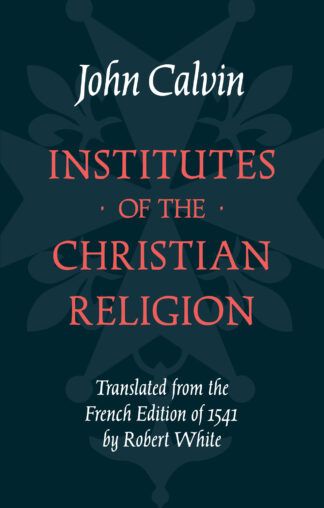‘Institutes of the Christian Religion’ – A Review by Stephen Westcott
A review by Dr Stephen Westcott of John Calvin’s Institutes of the Christian Religion, translated by Robert White.1
After a long history of publishing Reformation, Puritan, and later Calvinistic books ‘Banner’ have returned to Reformed foundations by issuing this edition of John Calvin’s Institutes of the Christian Religion. This work, above any other, laid the theological foundation for the Reformed Churches and gave them their first systematic theology textbook. Amazingly it is a work that is as relevant and potentially important now as it was then, and as readable, for the translator and publisher have produced it in a very pleasing and attractive format.
Presenting and explaining the great truths of the Christian faith was a lifetime concern for Calvin. The first edition of his Institutes was penned with a specific and urgent purpose: it was an ‘apology’ for Protestantism presented to Francis I of France in 1536, aimed at mitigating Romanist persecution of the Huguenot Christians, and was written in the scholarly Latin of the day. The work was soon recognised as a masterly summary of biblical truth, and edition after edition was called for, progressively expanded until the final version, in 1559. Translations were soon made into all major European languages, the first English one being that of Norton, in 1561. This was supplanted by the Henry Beveridge version (1845), which held the field until the appearance of the classic and scholarly annotated ‘McNeil-Battles’ translation of 1960.
Why the new ‘Banner’ version? The previous ones were translated from Calvin’s final ‘definitive’ Latin edition, and are two-volume sets. Translations from Latin are necessarily scholarly. This translation, in contrast, is from Calvin’s French edition of 1541. In his native French Calvin is far less formal, more relaxed in style, and this is excellently conveyed in Robert White’s translation. Also, one thick volume is a more accessible format than a set. What is more, this edition was Calvin’s own favourite, his ‘essentials’ edition.
Calvin did not ‘invent’ Reformed theology. His Institutes follow the ‘Apostles’ Creed’ through four major sections:
1. Knowledge of God, and of ourselves.
2. Christ and salvation accomplished.
3. The Holy Spirit and salvation applied.
4. The Church.
Within this framework seventeen solid Chapters present masterly discussions of the place of the Law, Repentance, Faith, Justification, the agreements and differences between the Testaments, Prayer, the Sacraments, the Church, the Christian life, and the Christian’s relation to civil government, and much more. Because it is a modern translation there is nothing ‘dated’ about this production. It reads as easily as any current systematic theology textbook (and for content, page-for-page, puts most of them into the shade!). Indeed, if a family need just one systematic textbook to give an overview of biblical doctrine, and to use as a reference when questions arise, they could hardly do better than purchase this edition of Calvin. Needless to say it is extremely well produced, as we have come to expect from this publisher.
Notes

Institutes of the Christian Religion
1541 Edition
price From: $20.00Description
A review by Dr Stephen Westcott of John Calvin’s Institutes of the Christian Religion, translated by Robert White.1 After a long history of publishing Reformation, Puritan, and later Calvinistic books ‘Banner’ have returned to Reformed foundations by issuing this edition of John Calvin’s Institutes of the Christian Religion. This work, above any other, laid the […]
From the British Church Newspaper, April 2015.
Latest Articles
On the Trail of the Covenanters February 12, 2026
The first two episodes of The Covenanter Story are now available. In an article that first appeared in the February edition of the Banner magazine, Joshua Kellard relates why the witness of the Scottish Covenanters is worthy of the earnest attention of evangelical Christians today. In late November of last year, on the hills above […]
A Martyr’s Last Letter to His Wife February 11, 2026
In the first video of The Covenanter Story, which releases tomorrow, we tell the story of James Guthrie, the first great martyr of the Covenant. On June 1, the day he was executed for high treason, he coursed the following farewell letter to his wife: “My heart,— Being within a few hours to lay down […]
